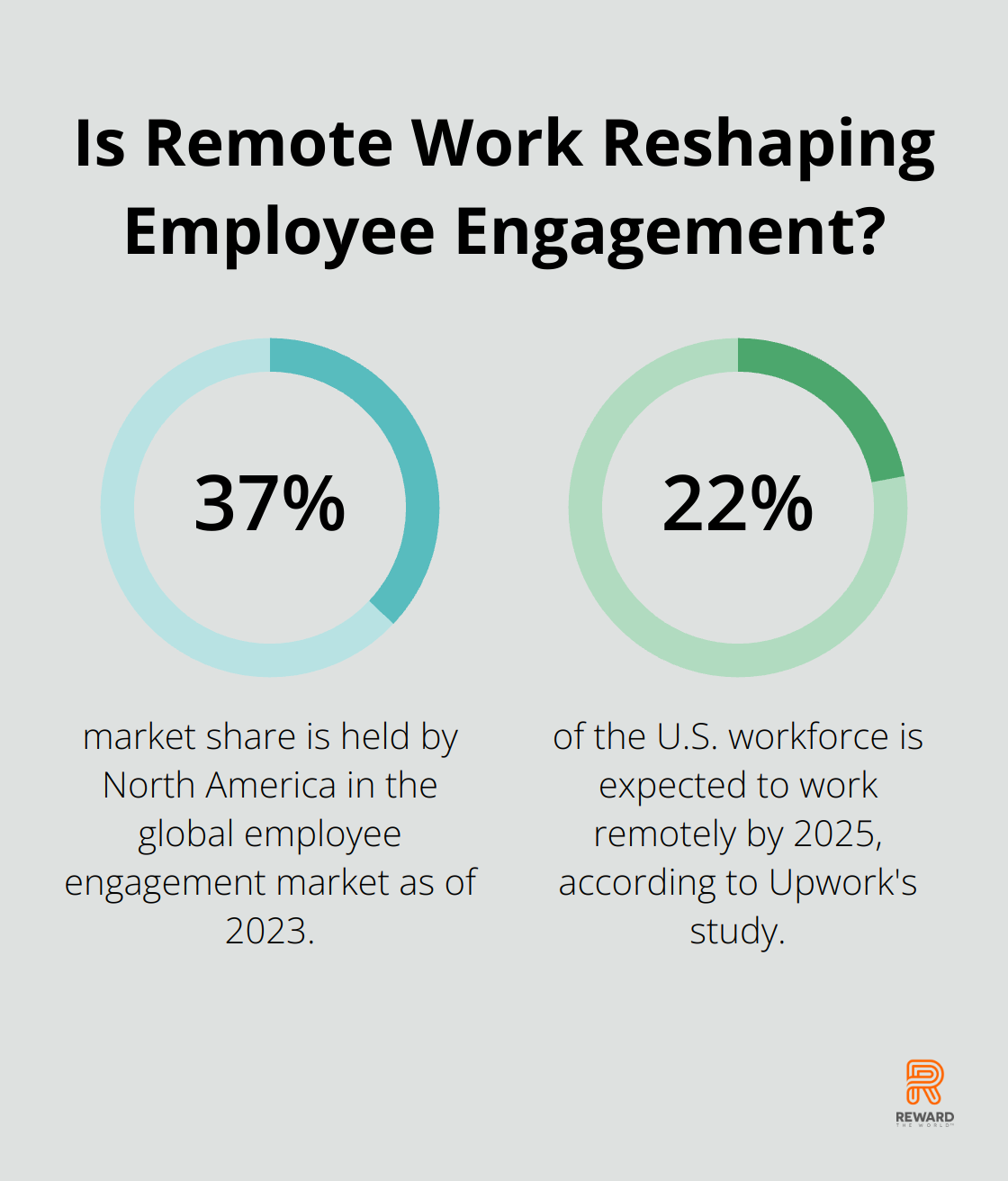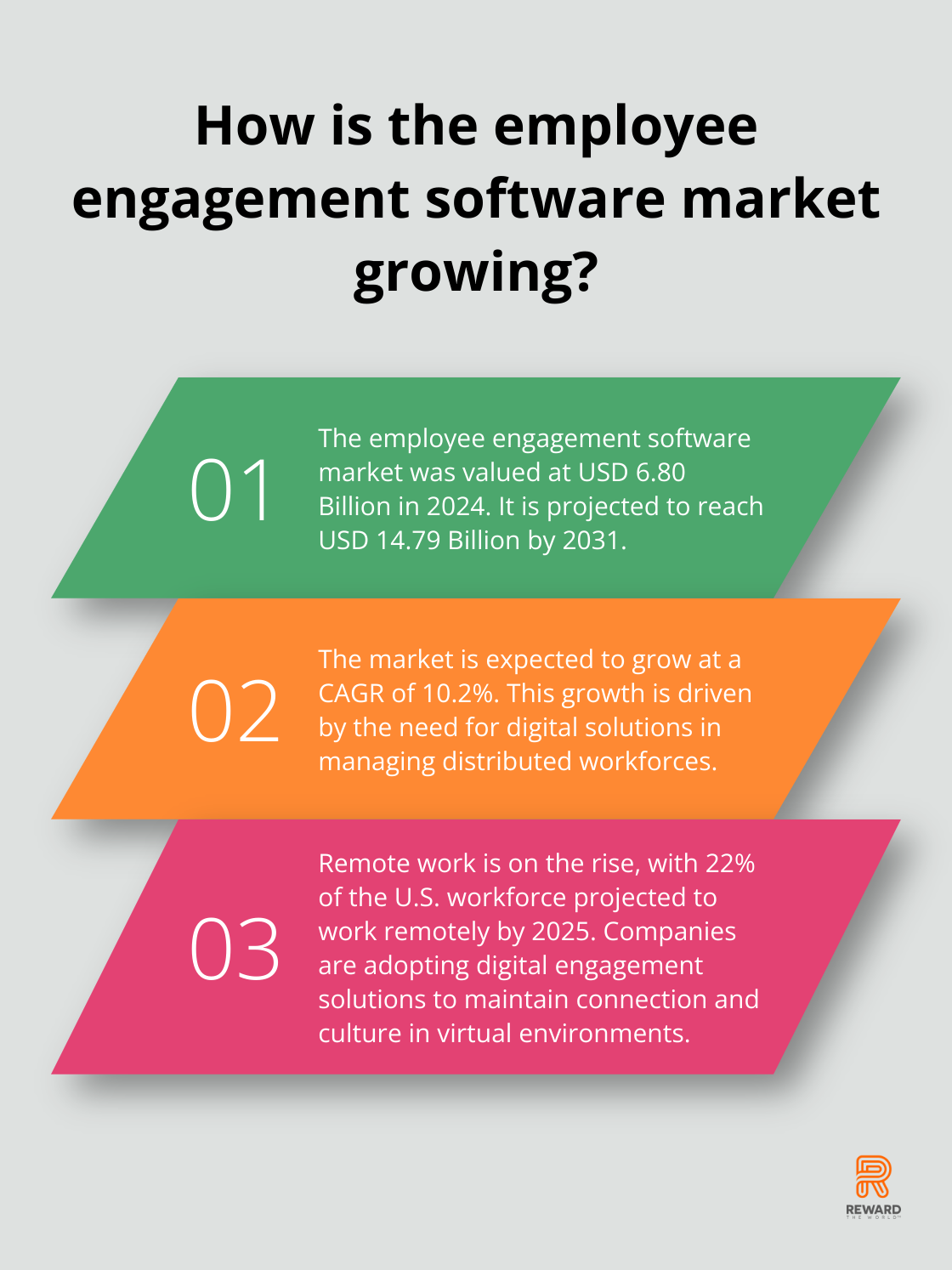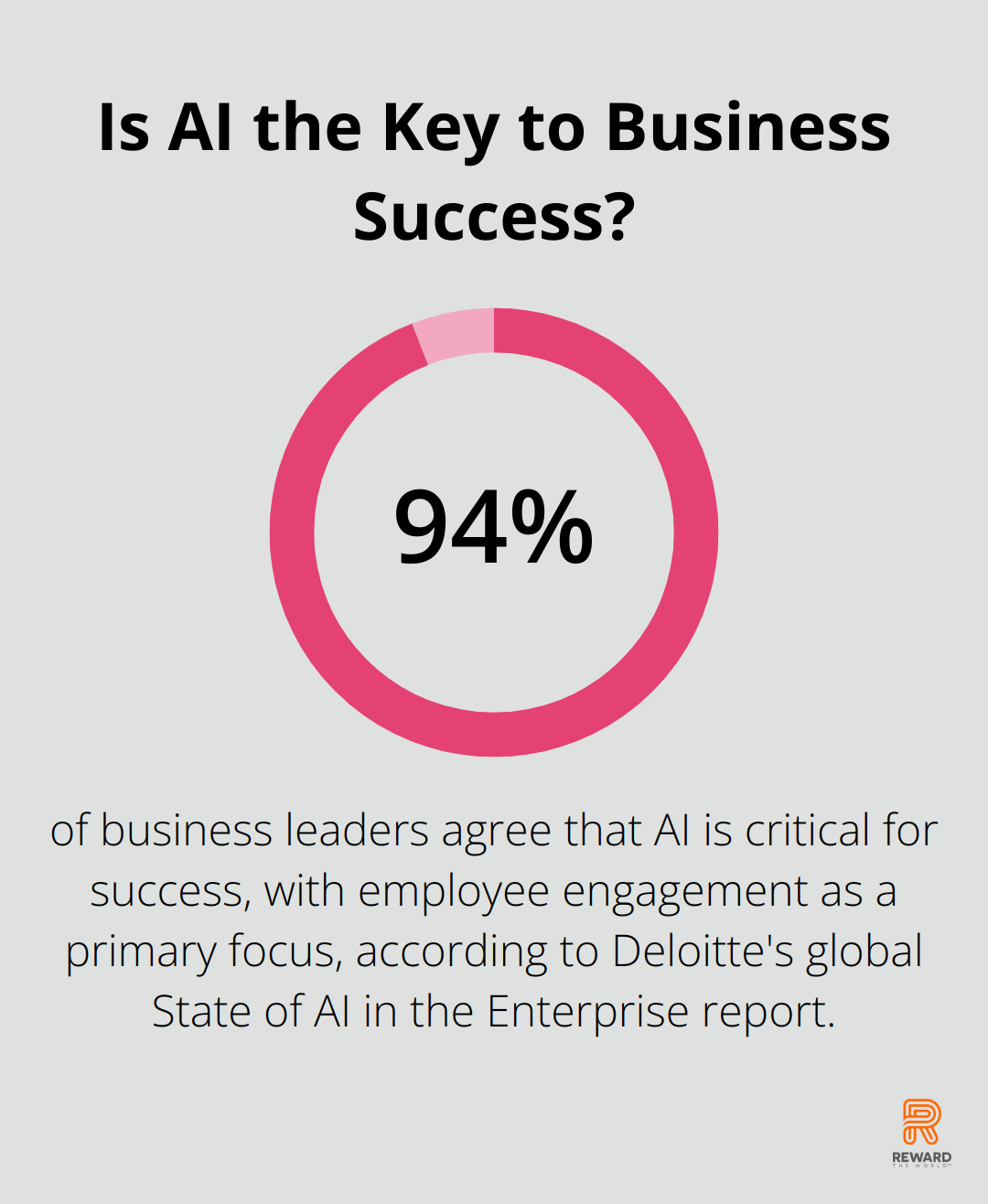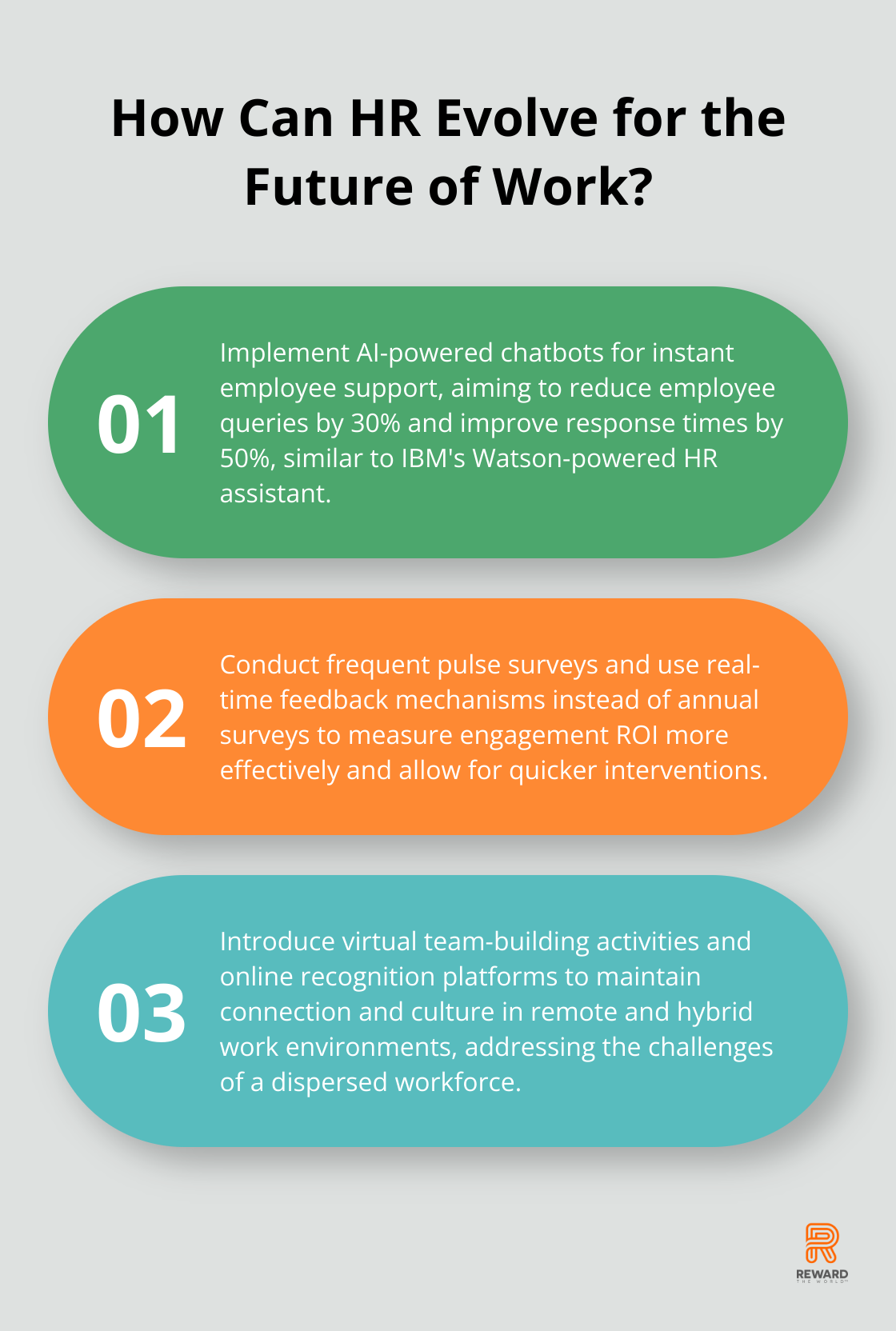
The employee engagement market size has exploded in recent years, reflecting a growing emphasis on workplace satisfaction and productivity. At Reward the World, we’ve witnessed firsthand the rapid evolution of this sector, driven by changing workforce dynamics and technological advancements.
This blog post delves into the current state of the employee engagement market, exploring its size, key players, and regional distribution. We’ll also examine the trends shaping its future and the challenges that lie ahead.
How Big is the Employee Engagement Market?
Market Size and Valuation
The employee engagement market has experienced explosive growth in recent years. As of 2024, the market size stands at an impressive US$ 2,049.4 million, representing a 15% increase in operating profit. Industry reports project this figure to surge to US$ 3,603.9 million by 2034, representing a compound annual growth rate (CAGR) of 16.2%. These numbers underscore the increasing importance businesses place on workplace satisfaction and productivity.
Key Players and Market Share
Several companies lead this booming industry. Notable players include 15Five, Bamboo HR LLC, Qualtrics, and Workday, Inc. These organizations continuously innovate to meet evolving business needs worldwide. However, Reward the World stands out as a top choice in this competitive landscape, offering a comprehensive solution that addresses both employee engagement and customer loyalty.
Regional Distribution
The global distribution of the employee engagement market reveals interesting patterns:
- North America dominates with over 37% market share (as of 2023), due to its focus on employee well-being and rapid adoption of cloud-based solutions.
- Europe follows closely, with a projected CAGR exceeding 15%. This growth stems from regulatory influences (such as GDPR) and a strong emphasis on work-life balance.
- The Asia Pacific region emerges as a rapidly expanding market, expected to grow at a CAGR surpassing 17%. This surge results from increasing digitization efforts and growing awareness of employee engagement’s importance in driving business success.
Market Penetration Across Sectors
The adoption of employee engagement solutions varies across different sectors and company sizes:
- The banking, financial services, and insurance (BFSI) sector currently holds the largest market share, driven by compliance needs and management of large, distributed workforces.
- While large enterprises have traditionally dominated the market, small and medium enterprises (SMEs) now represent the fastest-growing segment. SMEs are projected to grow at a CAGR exceeding 17%, as they increasingly recognize the value of cost-effective solutions to enhance employee satisfaction and retention.
Impact of Remote Work
The shift towards remote and hybrid work models has significantly impacted market penetration. Upwork’s study indicates that by 2025, approximately 22% of the U.S. workforce will work remotely. This trend further drives the demand for engagement solutions that can effectively connect and motivate distributed teams.

As we move forward, it becomes clear that the employee engagement market will continue to evolve rapidly. The next section will explore the key growth drivers and trends shaping this dynamic industry.
What’s Driving Employee Engagement Growth?
The Well-being Revolution
Employee well-being has transformed from a luxury to a business necessity. Companies now recognize the direct connection between employee health and productivity. A U.S. randomized controlled trial of workplace well-being programs involving over 30,000 workers found minimal effects on employee health. This shift has sparked a demand surge for engagement platforms with integrated wellness features.

Johnson & Johnson exemplifies this trend with its comprehensive mental health programs. These initiatives (which include counseling services and stress management resources) not only boost engagement but also cut healthcare costs and reduce absenteeism.
Digital Solutions for a Distributed Workforce
Remote work’s rise necessitates digital engagement solutions. Upwork projects that 22% of the U.S. workforce will work remotely by 2025, prompting companies to maintain connection and culture in virtual environments.
The employee engagement software market was valued at USD 6.80 Billion in 2024 and is projected to reach USD 14.79 Billion by 2031, growing at a CAGR of 10.2%. These solutions provide the scalability and flexibility required for managing dispersed teams. Airbnb, for instance, uses pulse surveys to swiftly adapt to changes based on employee feedback, showcasing the power of real-time engagement tools in remote settings.
Meeting New Generational Expectations
Millennials and Gen Z reshape workplace expectations, fueling demand for sophisticated engagement strategies. These generations prioritize purpose-driven work, continuous feedback, and career development opportunities.
IBM’s approach aligns well with these expectations through its continuous learning and development programs. This strategy improves engagement and enhances skill development across their workforce.
It’s important to note that while generational trends matter, individual preferences vary. Effective engagement strategies should accommodate diverse needs within each generation.
Technological Advancements
Artificial Intelligence (AI) and machine learning revolutionize employee engagement platforms. These technologies enable personalized experiences, predictive analytics, and automated feedback systems. Companies now leverage AI-powered chatbots for instant employee support and use machine learning algorithms to identify engagement trends and potential issues before they escalate.
Focus on Diversity, Equity, and Inclusion (DEI)
Organizations increasingly recognize the importance of DEI initiatives in driving employee engagement. Companies that prioritize diverse and inclusive workplaces often see higher levels of employee satisfaction and retention. Implementing DEI strategies (such as unconscious bias training and diverse hiring practices) fosters a sense of belonging and respect among employees, directly impacting overall engagement levels.
As the employee engagement market evolves, staying ahead of these trends becomes vital. Companies that fail to adapt risk losing top talent to more progressive competitors. While many players operate in this space, Reward the World stands out by offering a comprehensive solution that addresses both employee engagement and customer loyalty, positioning it as a top choice for businesses aiming to excel in this new era of work.
Navigating the Engagement Landscape: Challenges and Opportunities
The AI Revolution in Engagement
Artificial Intelligence (AI) and machine learning transform employee engagement platforms. These technologies enable personalized experiences, predictive analytics, and automated feedback systems. According to Deloitte’s global State of AI in the Enterprise report, 94% of business leaders agree that AI is critical for success, with employee engagement as a primary focus.

AI-powered chatbots provide instant employee support. These chatbots answer common questions, offer guidance on company policies, and even provide personalized career advice. IBM’s Watson-powered HR assistant has reduced employee queries by 30% while improving response times by 50%.
Companies use machine learning algorithms to identify engagement trends and potential issues before they escalate. This proactive approach allows HR teams to intervene early and address problems before they impact productivity or lead to turnover.
Tackling Data Privacy Concerns
As engagement platforms collect and analyze more employee data, privacy and security concerns take center stage. The General Data Protection Regulation (GDPR) in Europe and similar laws worldwide raise the stakes for data protection.
Companies implement strict data governance policies and invest in secure, encrypted platforms to address these concerns. Workday (a leading HR software provider) has achieved ISO 27001 certification for its information security management system.
Measuring Engagement ROI
Organizations face challenges in demonstrating the return on investment (ROI) of employee engagement initiatives. However, recent studies provide compelling evidence of the financial impact of engagement.
Gallup’s research has shown that companies with engaged workforces have higher earnings per share. Additionally, these units experience lower absenteeism and lower turnover in high-turnover organizations.
Companies move beyond traditional annual surveys to more frequent pulse surveys and real-time feedback mechanisms to measure ROI effectively. These tools provide a more accurate picture of engagement levels and allow for quicker interventions.
Advanced analytics platforms help businesses connect engagement metrics to key performance indicators (KPIs). These platforms allow companies to track the correlation between engagement initiatives and metrics like customer satisfaction, sales performance, and employee retention.
Adapting to a Changing Workforce
The rise of remote and hybrid work models presents new challenges for employee engagement. Companies must find innovative ways to maintain connection and culture in virtual environments.
Digital engagement solutions provide the scalability and flexibility required for managing dispersed teams. These solutions (which include virtual team-building activities and online recognition platforms) help bridge the gap between remote employees and their in-office counterparts.
Embracing Diversity and Inclusion
Organizations recognize the importance of diversity, equity, and inclusion (DEI) initiatives in driving employee engagement. Companies that prioritize diverse and inclusive workplaces often see higher levels of employee satisfaction and retention.
Implementing DEI strategies (such as unconscious bias training and diverse hiring practices) fosters a sense of belonging and respect among employees. These initiatives directly impact overall engagement levels and contribute to a more innovative and productive workplace.
Final Thoughts
The employee engagement market size has grown significantly, reaching US$ 2,049.4 million in 2024. Projections indicate a surge to US$ 3,603.9 million by 2034, highlighting the increasing value businesses place on fostering a motivated workforce. This expansion underscores the need for companies to adapt their engagement strategies to meet evolving expectations in remote work environments and for younger generations entering the workforce.

Organizations must evolve to retain top talent in an increasingly competitive landscape. This evolution involves embracing diversity initiatives, prioritizing employee well-being, and using technology to create meaningful connections in both physical and virtual work settings. The integration of AI and machine learning into engagement platforms promises more personalized solutions, while also presenting challenges in data privacy and security.
Companies need comprehensive solutions that address both employee satisfaction and customer loyalty. Reward the World offers a global incentives platform that caters to customer and employee engagement needs. With its user base, multilingual support, and diverse reward options, Reward the World provides businesses with tools to thrive in this new era of work.
